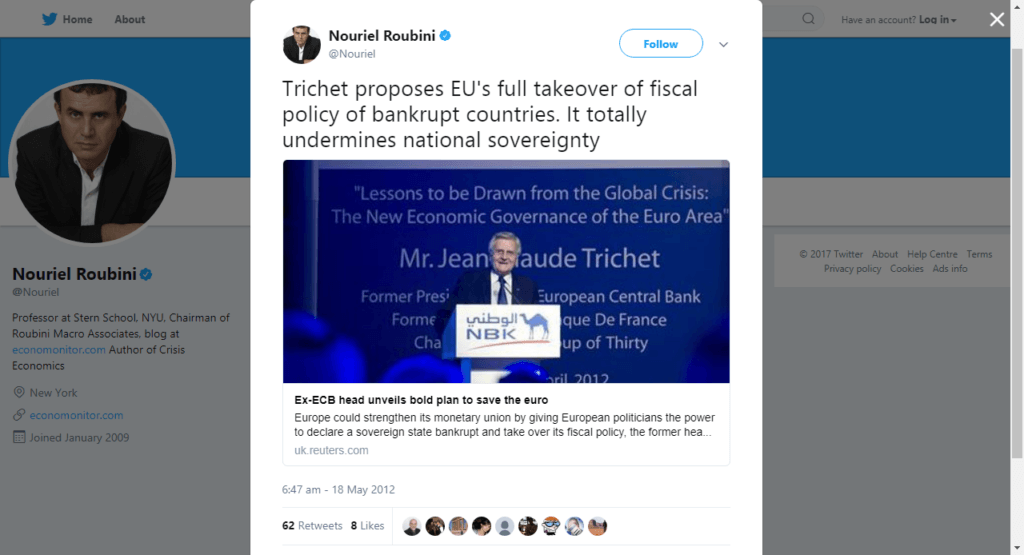Nouriel Roubini tweets about Trichet’s plan to save the Euro Zone and wonders about sovereignty:
click to view the tweet on Twitter
Two things:
My guess is Trichet’s plan involves a Euro Area institution setting fiscal policy. Trichet’s plan seems to involve some set of technocrats taking control of fiscal policy of a weak nation and then deflating domestic demand and hence not solving anything at all or making it worse. Here it is – clear from the following:
For the European Union, a fully fledged United States of Europe where nation states cede a large chunk of fiscal authority to the federal government appears politically unpalatable, Trichet said.
An alternative is to activate the EU federal powers only in exceptional circumstances when a country’s budgetary policies threaten the broader monetary union, he said.
Secondly, Nouriel Roubini thinks it “undermines national sovereignty” but the Euro Area nations had given this up long back! So while Euro Area nations surrendered sovereignty long back, Trichet’s plan involves removing more powers from governments without the possibility of those nations receiving fiscal equalization in return!
Trichet’s plan hence has a “central government” with no fiscal authority! There was no sovereignty to begin with and no institution taking up the sovereignty either.
The Man Who Saw Through The Euro had a profound way of looking at how economies function. Wynne Godley already understood in 1992 that by joining the Euro Area, nations surrender their sovereignty. In his article 20 years back Maastricht And All That, Godley said:
But there is much more to it all. It needs to be emphasised at the start that the establishment of a single currency in the EC would indeed bring to an end the sovereignty of its component nations and their power to take independent action on major issues.
and that:
… I recite all this to suggest, not that sovereignty should not be given up in the noble cause of European integration, but that if all these functions are renounced by individual governments they simply have to be taken on by some other authority. The incredible lacuna in the Maastricht programme is that, while it contains a blueprint for the establishment and modus operandi of an independent central bank, there is no blueprint whatever of the analogue, in Community terms, of a central government.
and also that:
If a country or region has no power to devalue, and if it is not the beneficiary of a system of fiscal equalisation, then there is nothing to stop it suffering a process of cumulative and terminal decline leading, in the end, to emigration as the only alternative to poverty or starvation.
In an article Commonsense Route To A Common Europe in 1991 in The Observer, Godley said:
If we are to proceed creatively towards EMU, it is essential to break out of the vicious circle of ‘negative integration’— the process by which power is progressively removed from individual governments without there being any positive, organic, all-European alternative to transcend it. The nightmare is that the whole country, not just the countryside becomes at best a prairie, at worst a derelict area.
